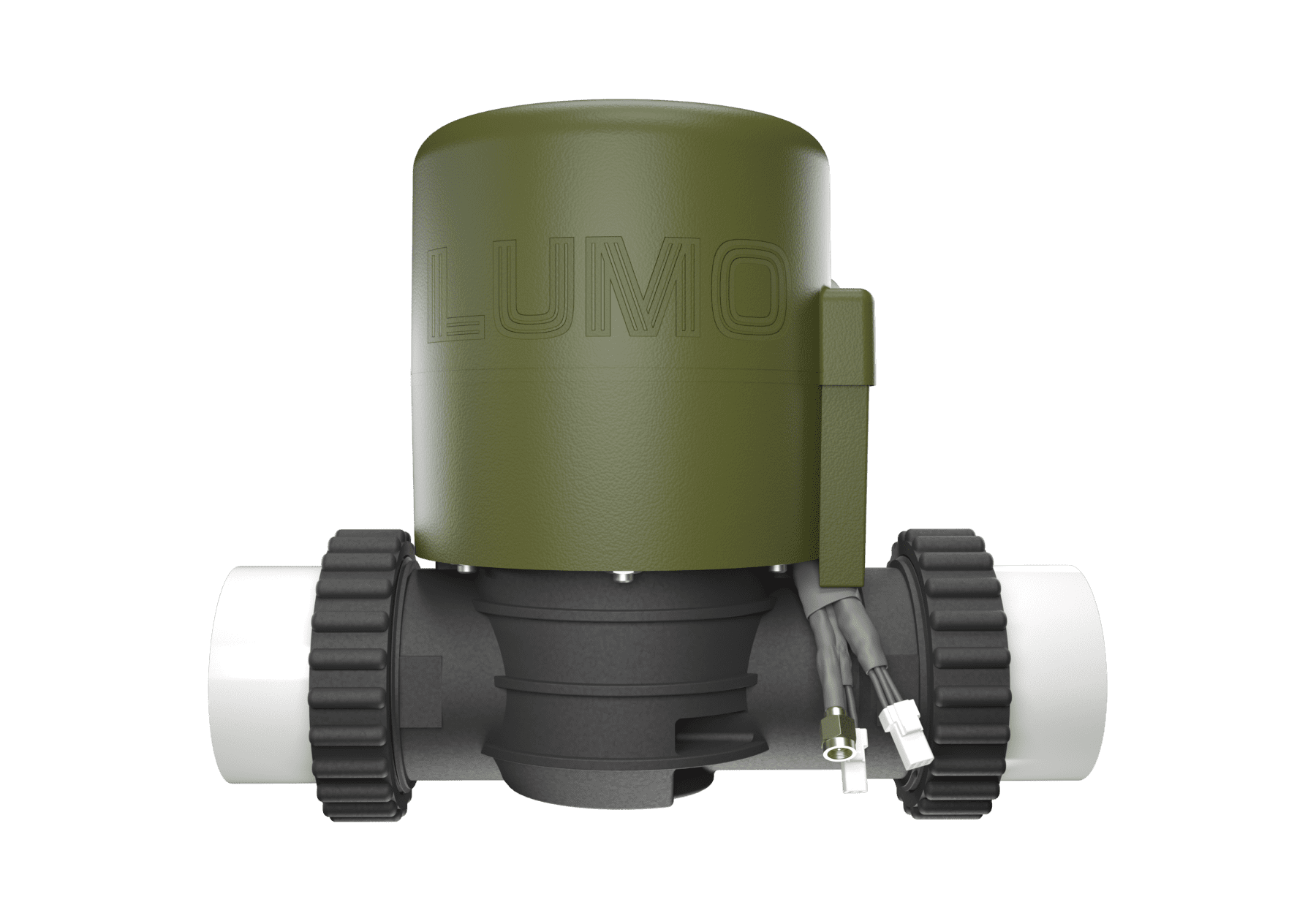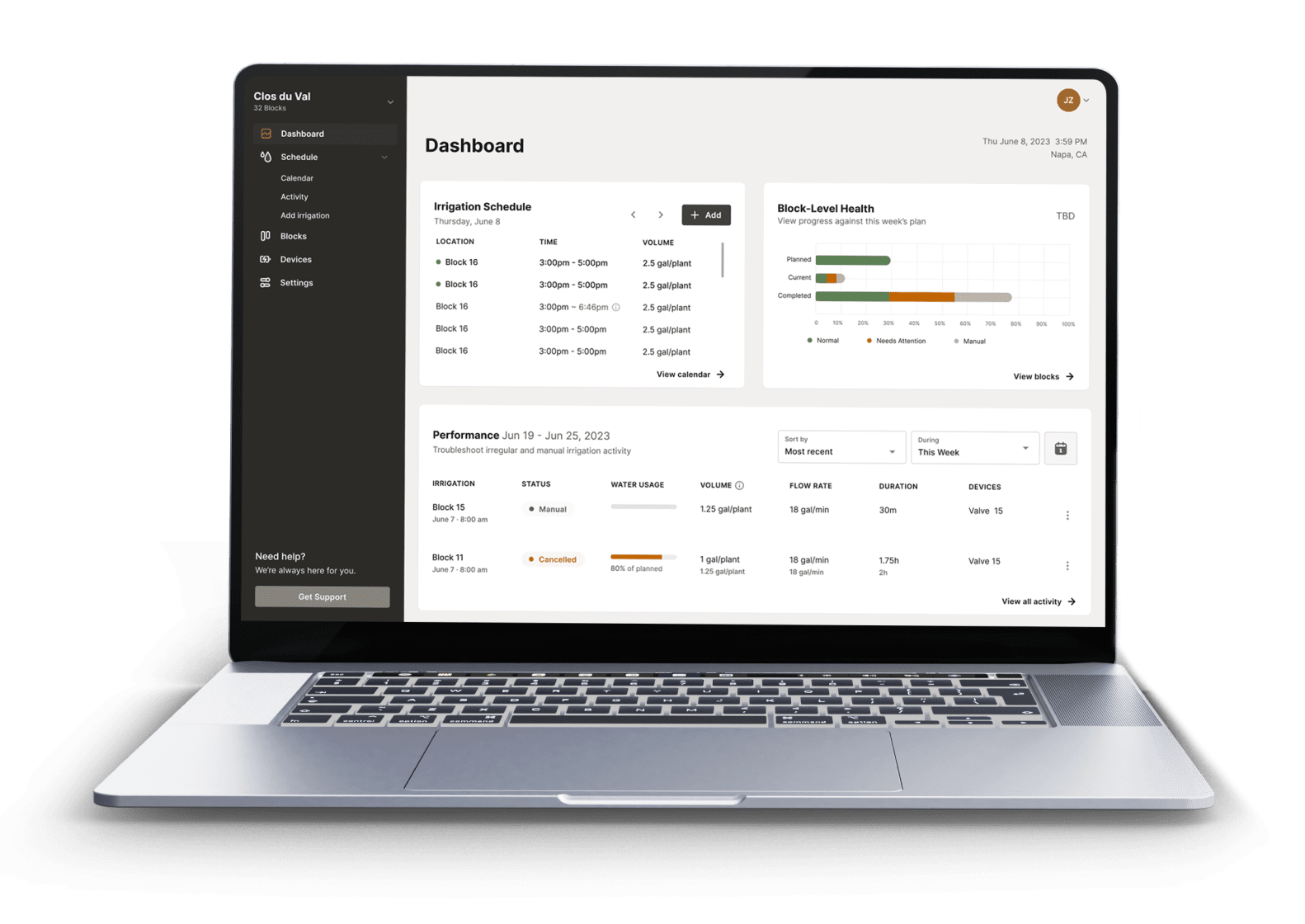Irrigation
on autopilot
Smart Water Valve Technology That’s Purpose Built for Growers
Introducing the industry’s first smart Water valve. No more controllers or base stations. No more trenching for wires. No more wondering whether a scheduled irrigation actually happened
All-in-one
Smart Water Valve Solution

THe Lumo Smart Valve
The only smart irrigation valve with built-in communications and flow monitoring.

The Lumo Ops Center
Irrigation management software that provides complete visibility and control over your irrigations.

The Lumo Support Team
Support and service comes standard and is available on-site and on-line
How Lumo’s Smart Water
Valve Works
- 1. Install Lumo smart valves in your irrigation blocks/zones. Done by you or our Field Team.
- 2. Log in to The Ops Center to create or modify your irrigation schedule.
- 3. Lumo automatically runs irrigations and monitors for leaks or abnormalities.
- 4. Audit and optimize your irrigation operations with data and reporting.
Smart Water Valve
Benefits
Eliminate Costs
by automating up to 90% of your current irrigation labor.
Monitor Your Irrigations
in real-time with Lumo’s irrigation management software.
Deliver the Exact Amount of Water
by specifying a target volume by block or zone.
Backed by Your Local Lumo Support Team
to ensure your irrigations perform flawlessly.

DIG DEEPER Into Lumo’s SMart Water Valve
We provide a cellular modem that establishes the initial internet connection. Once that is complete, each smart water valve is connected to one another using a mesh WiFi network. This makes it possible to cover long distances across challenging topographies and obstructions like tree lines.
A smart water valve for agriculture offers numerous benefits by enhancing the efficiency, control, and sustainability of irrigation systems. These valves, equipped with sensors and automation features, allow farmers to precisely manage water delivery to crops. Below are the key benefits:
1. Water Conservation
- Precision Control: Delivers the exact amount of water needed, minimizing waste.
- Leak Detection: Identifies and alerts users to leaks or anomalies in water flow, preventing wastage.
- Prevention of Overwatering: Automatically shuts off water when the soil moisture levels reach optimal thresholds.
2. Increased Efficiency
- Automated Scheduling: Allows irrigation to be scheduled based on crop needs, weather conditions, or soil moisture data.
- Remote Operation: Enables farmers to control valves from smartphones, tablets, or computers, reducing the need for manual labor.
- Real-Time Adjustments: Reacts to real-time data such as rainfall or temperature changes to optimize water use.
3. Cost Savings
- Reduced Water Bills: Efficient water usage leads to significant cost reductions.
- Lower Labor Costs: Automation reduces the need for manual intervention in irrigation management.
- Energy Savings: Optimized water flow reduces the energy required to pump water.
4. Improved Crop Health and Yield
- Uniform Water Distribution: Ensures consistent and appropriate watering, leading to healthier crops.
- Reduced Stress on Crops: Avoids overwatering or underwatering, which can damage plants.
- Customizable Zones: Allows precise irrigation for different sections of a farm, accommodating crops with varying water needs.
5. Sustainability
- Reduced Runoff: Prevents water from spilling into areas where it is not needed, protecting surrounding ecosystems.
- Minimized Soil Erosion: Controlled water application avoids soil displacement and nutrient loss.
- Better Resource Management: Promotes sustainable water use, critical in drought-prone regions.
6. Integration with Smart Systems
- Weather-Based Irrigation: Syncs with weather forecasts to adjust irrigation schedules.
- Soil Moisture Sensors: Works with sensors to provide water only when the soil is dry.
- IoT Connectivity: Integrates with other smart farming technologies for a holistic precision agriculture system.
7. Easy Maintenance and Monitoring
- Real-Time Alerts: Sends notifications about system malfunctions, leaks, or water supply issues.
- Performance Tracking: Monitors water usage over time to identify inefficiencies and improve practices.
- Self-Cleaning Features: Some smart valves come with self-cleaning capabilities to prevent clogs.
8. Scalability
- Adaptable to Different Farm Sizes: Suitable for both small farms and large-scale agricultural operations.
- Zone Management: Controls multiple irrigation zones from a single interface, simplifying large farm management.
9. Time Savings
- Hands-Free Operation: Automates irrigation tasks, giving farmers more time for other important activities.
- Quick Response: Adjustments can be made instantly through mobile apps or remote systems.
10. Environmental Compliance
- Regulatory Adherence: Helps farmers comply with water usage restrictions or quotas in water-scarce regions.
- Data Logging: Provides records of water usage for reporting and sustainable certification purposes.
No, the smart water valves do not require expensive and complex irrigation controllers, as all of the settings are powered by Lumo’s cloud platform. As long as you’re using a Lumo One valve, you have the ability to control it from anywhere with Lumo’s irrigation management software, aka The Ops Center.
There is no limit to how many smart water valves you can use. Some growers only require a valve at the block level, while other prefer to create sub-blocks or even use a valve for each row of crops to achieve maximum control. With Lumo, you have complete control over how granular you want to get with your water distribution.
Lumo’s price is based on the number of valves you need, your acreage and any unique accommodations you may require. If you’d like an estimate, let’s chat by emailing us at [email protected]Learn more - Book a demo with our team